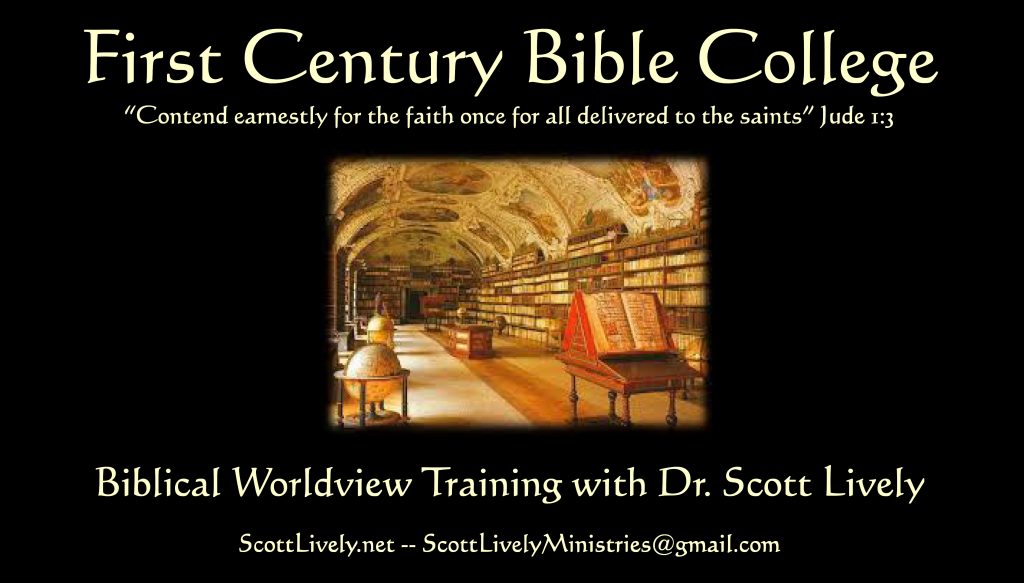
The Official Launch of First Century Bible College was January 7th, 2020
Our first goal is to produce a set of short lessons in essay and video formats that teach the Biblical worldview holistically: integrating theology and critical thinking with practical application to history, politics and current events. These resources will serve collectively as an “Orientation Course” for students.
The video form of the Orientation Course is free to the public as a YouTube Playlist. Both the video and essay forms are also freely available as posts on this website, categorized as “First Century Bible College Orientation.”
Completion of the Orientation Course is mandatory for admission to the college and scholastic credit for the course will only be granted to registered students. Prospective Students May Register below.
The long term vision for First Century Bible College is to pursue post-denominational Christian unity on the essentials of the faith as they were understood from the Hebrew cultural perspective of the Apostles.
For those matters deemed non-essentials, we will pursue a spirit and standard of charitable tolerance for differences of opinion and provide a perpetual open forum for civil discourse and debate.
We will discourage “tribalism” in which people form teams around a slate of doctrines and treat them as dogma, which is largely our definition of denominationalism.
We will instead promote a model of critical thinking and personal study of the Bible itself, rather than the study of other people’s interpretations of the Bible as is unfortunately the custom of most of the modern seminary systems.
Our vision of Christian unity is thus not uniformity of beliefs in all matters as denominationalism intends, but a diversity of perspectives on non-essentials reflecting the uniqueness of each person and their unique place and purpose in the Creation: yet each growing from the same soil on the same bedrock of truth.
The “essentials of the faith” are to some degree a matter of opinion, but we have settled upon our own conclusions and divided them in two categories: Doctrinal and Behavioral.
Doctrinally, Christians have been grappling with the essentials from the beginning but reached a very broad consensus with the Revised Nicene Creed of 381AD. * We consider that our doctrinal bedrock.
For our faculty we have added a prerequisite of commitment to Biblical inerrancy, and have adopted the “1978 Chicago Statement on Biblical Inerrancy.” **
We have also adopted with slightly less rigidity “The 42 Articles on the Essentials of a Christian Worldview.” ***
Behaviorally, we consider the two great commandments of Jesus to be the bedrock of essential Christianity: “To love the Lord your God with all your heart, soul, mind and strength, and to love your neighbor as yourself.” We consider these to be a summarization of the Ten Commandments, whose specificity in turn provides guidelines for extrapolation to all other matters.
As a practical matter in this current age, we expressly require adherence to the “one flesh” paradigm of marriage based male/female heterosexual monogamy and to the patriarchal model of family and church life.
Our Philosophy of Education
The goal of First Century Bible College is for our students to achieve the greatest Biblical literacy of which each is personally capable, and to facilitate the maximum positive impact of that knowledge in the world and in the church.
We believe that each student is uniquely gifted by God to serve the Cause of Christ and that the Holy Spirit will clearly direct the path of education and ministry for those whose minds and hearts attend to Him.
We thus believe the role of First Century Bible College is to facilitate student self-direction and self-determination in the course of study — working to assist the student in discovering God’s will and pursuing it with maximum efficiency and effectiveness.
While we offer pre-set classes and topical certificate programs in a full range of subjects — and encourage students to explore these topics as a means of clarifying their gifts and direction, our concept of Degree Certification is that no two degrees should be identical but that each degree program should be designed by the student him or herself with faculty and administrative assistance as needed.
Even our certificate programs can be designed by students to suit their own goals and interests, because all classes are considered modules that can be strung like pearls on a string in any order, subject to practical limitations such as sequential prerequisites. But as to topical diversity there are no limitations, because any set of topical studies can produce its own final product that can be titled accordingly.
If a student wishes to pursue a course of study for which the college has no current faculty, the college will seek to recruit faculty specially for that student.
Students are allowed to pick their own teachers and advisors from a full menu of faculty and staff whose credentials, topical specialties, and detailed profiles are provided online.
And students are allowed to pursue hands-on activities in the field on their own initiative (such as mission trips), for college credit, subject to documentation.
Our Philosophy of Incoming Faculty Credentials
First Century Bible College does not place great emphasis on prior educational credentials for either students or faculty, but follows the Biblical maxim: “By their fruit you shall know them.”
We recognize that everyone has something to teach and much to learn, and that the letters one may list after one’s name have limited value in determining what those things are, absent a more holistic profile of one’s life experience and accomplishments.
To be faculty, we require only that a documented “Curriculum Vitae” be published on our website for prospective students to review, and agreement with certain legal formalities. First Century Bible College does not require any formal educational credentials if mastery of the topics to be taught is evident from other sources, such as publications or provable life experience.
Of course, all instructors must adhere to the Essentials of the Faith as defined by the college, but to provide students with a wide menu of educational options, we welcome diverse perspectives on non-essentials, within reason, subject to ongoing review and policy refinement by the administration.
Our Philosophy of Outgoing Graduate Credentials
Likewise for students, our certificate and degree programs emphasize documentation of results. Our graduates will be able to offer prospective employers or ministry supporters more than just a framed certificate or diploma, but actual work-product in the fields of study.
We do not want students who see education as nothing more than a hurdle to jump before their career begins. We want students who pursue their career through their studies, and produce measurable fruit from their efforts.
Similar to modern “degree completion programs” in Christian and secular colleges, incoming students can get credit for provable prior experience.
Our Organizational Structure and System
The Internet offers opportunities for education that did not exist in prior generations. Our online platform works as a hub to which both students seeking Bible education and instructors seeking students can come for mutual benefit and enrichment.
What First Century Bible College provides is an administrative system for providing an active Bible-centered online campus, managing educational interactions between students and faculty, collecting and distributing fees, and issuing credentials.
By heavily emphasizing unity on the essentials of the faith, charitable tolerance for diversity on non-essentials, high Biblical literacy, and a fruit-bearing credentialing model, First Century Bible College also serves as system to advance a culture of evangelism, discipleship and good works in Christendom.
From Concept to Reality: To be clear First Century Bible College is not yet operational. This is just the vision I am moving now to implement. I invite you to be a part of this project in whatever way the Holy Spirit directs.
Dr. Scott Lively
- THE NICENE CREED (381 A.D.)
We believe in one God, the Father, Ruler of all, maker of heaven and earth, and of all things visible and invisible. We believe in one Lord Jesus Christ, the only-begotten Son of God, begotten from the Father before all time; Light, from Light, true God from true God; begotten, not made; of the same essence as the Father, through Whom all things were made; Who for us and for our salvation came down from heaven and was incarnate by the Holy Spirit and the virgin Mary, and was made a man. He was crucified for us under Pontius Pilate, and suffered and was buried, and rose on the third day, according to the Scriptures. He ascended to heaven, and sits at the right hand of the Father. He shall come again with glory to judge the living and the dead; His kingdom shall have no end.
We believe in the Holy Spirit, the Lord and giver of life, Who proceeds from the Father and the Son, Who is worshiped and glorified together with the Father and Son, and Who spoke through the Prophets.
We believe that there is one holy, universal and apostolic church. We confess one baptism for the remission of sins, and we look for the resurrection of the dead and the life of the world to come. Amen.
** “The “Chicago Statement on Biblical Inerrancy” was produced at an international Summit Conference of evangelical leaders, held at the Hyatt Regency O’Hare in Chicago in the fall of 1978. This congress was sponsored by the International Council on Biblical Inerrancy. The Chicago Statement was signed by nearly 300 noted evangelical scholars, including James Boice, Norman L. Geisler, John Gerstner, Carl F. H. Henry, Kenneth Kantzer, Harold Lindsell, John Warwick Montgomery, Roger Nicole, J. I. Packer, Robert Preus, Earl Radmacher, Francis Schaeffer, R. C. Sproul, and John Wenham.
It can be viewed online at http://www.bible-researcher.com/chicago1.html
*** 42 Articles of the Essentials of a Christian World View: Articles of Affirmation and Denial and the Foundational Theology of The Coalition on Revival http://theapologeticsgroup.com/wp-content/uploads/2012/06/42_Articles_Christian_Worldview.pdf
Sample: The Nature of God
- We affirm that there is only one living God who is infinite in being and perfection, a most pure spirit, invisible, and absolutely distinct from His creation.
We deny any and all views of God that negate or deviate from the traditional Judeo-Christian concept of God, including Atheism, Deism, Finite-godism, Panentheism (Process God), Polytheism, and Pantheism. - We affirm that God is both transcendent over and immanent in His creation.
We deny that in His being God is totally Other or that He is identified with His creation. - We affirm that from time to time God supernaturally intervenes in the course of natural or human events to accomplish His redemptive purposes.
We deny any naturalistic view which either rejects a supernatural God or His miraculous intervention in nature or history. - We affirm that God is a personal, infinite, eternal, self-existent, unchangeable, indivisible, omnipotent, omniscient, omnipresent, spiritual being Who is the creator and sustainer of the universe.
We deny that God is impersonal, finite, temporal, changeable, divisible, material, or is limited in His power, knowledge, or presence in the universe.




